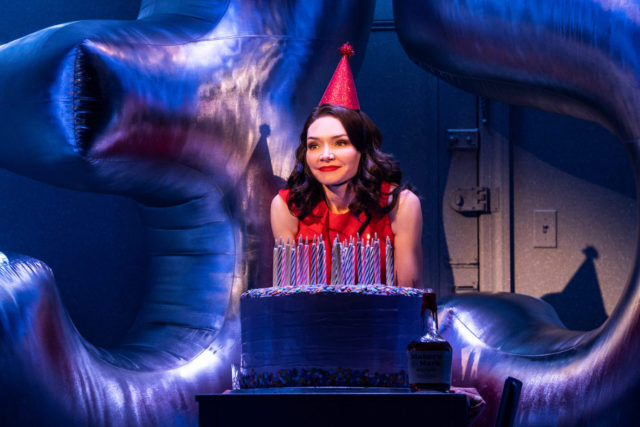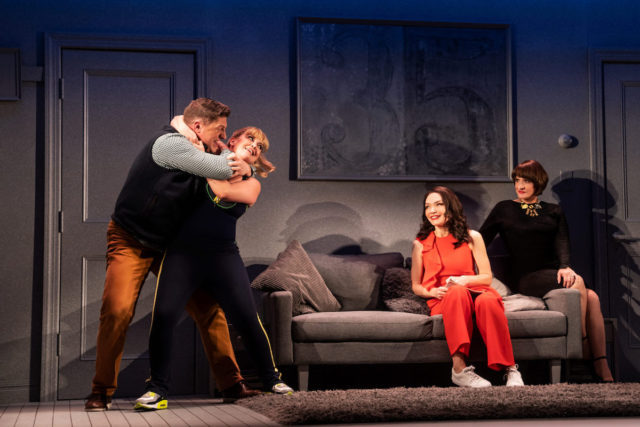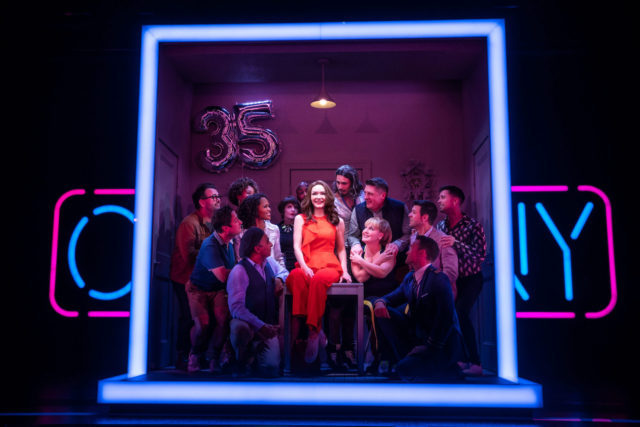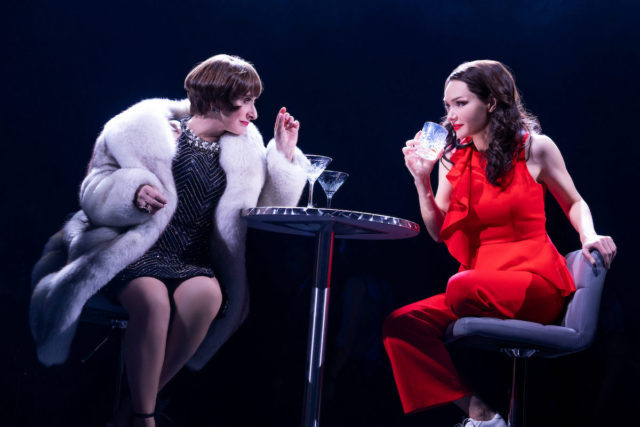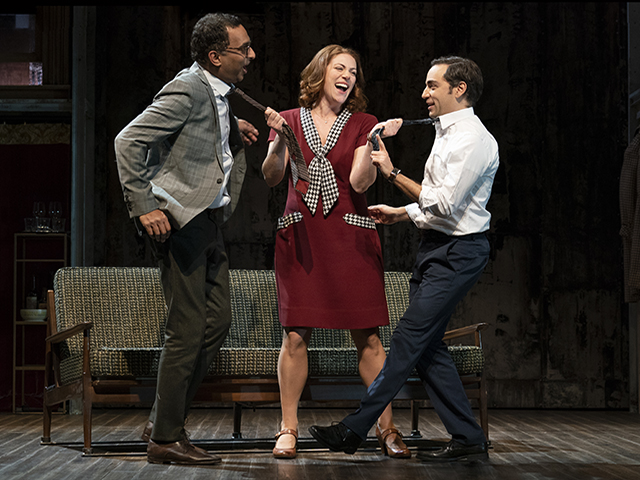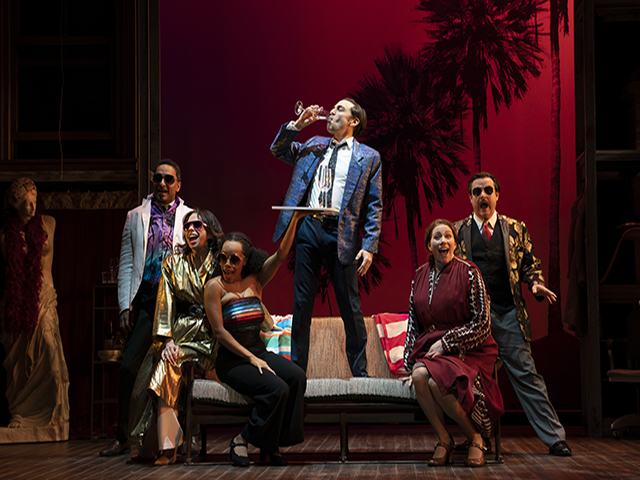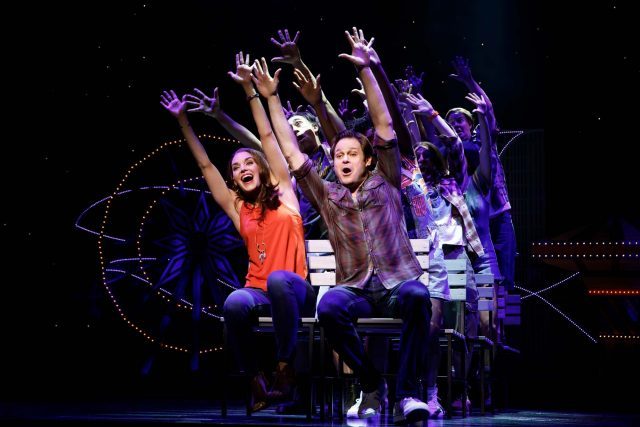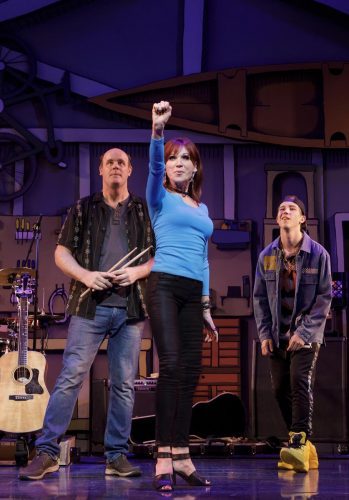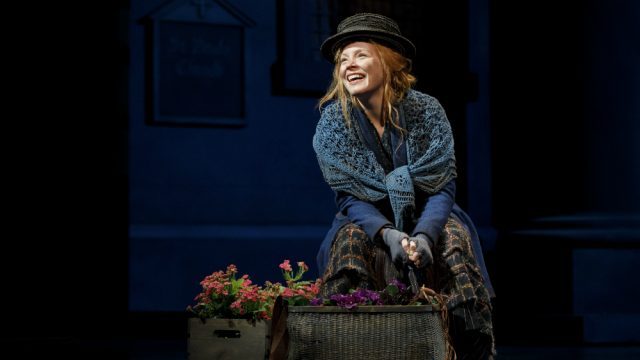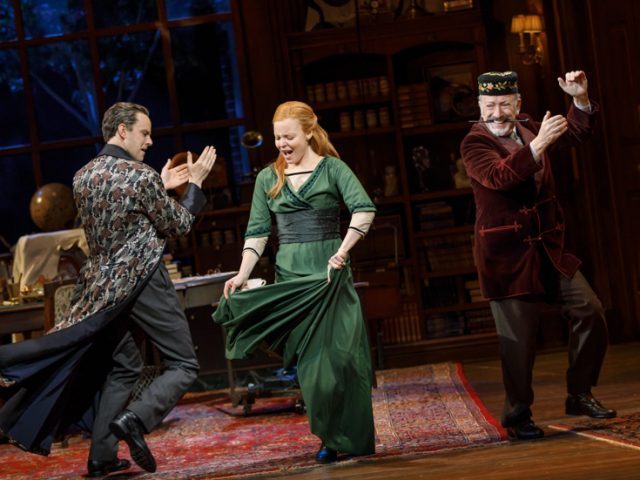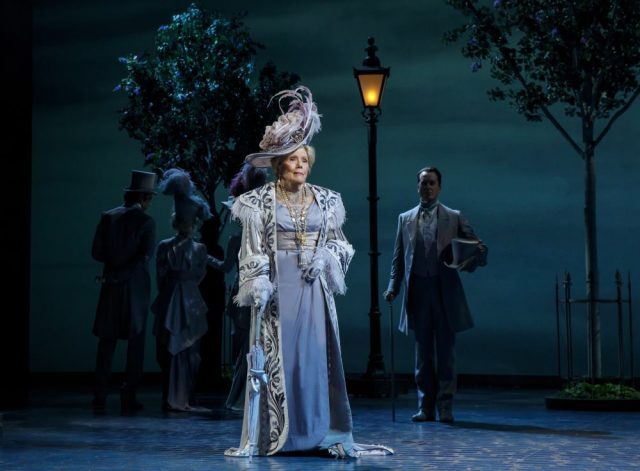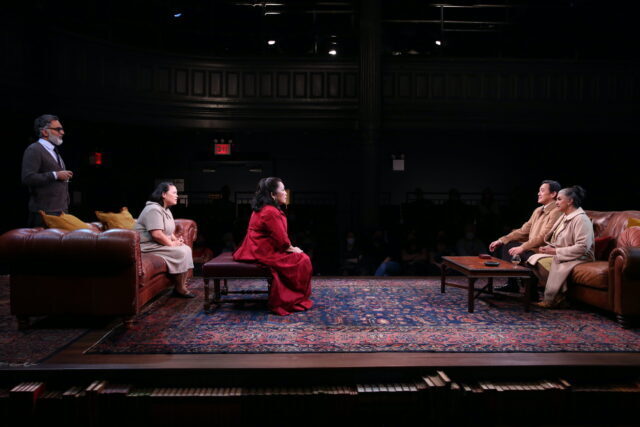
Tobias (Manu Narayan), Claire (Carmen M. Herlihy), and Agnes (Mia Katigbak) are stuck with Harry (Paul Juhn) and Edna (Rita Wolf) in Albee revival (photo by Carol Rosegg)
EDWARD ALBEE’S A DELICATE BALANCE
Connelly Theater
220 East Fourth St. between Aves. A & B
Thursday – Sunday through November 19, $35-$75
transportgroup.org
When I let a friend know that I was going to see the first-ever off-Broadway production of Edward Albee’s 1966 Pulitzer Prize–winning A Delicate Balance, he responded that he felt he didn’t need to see it because Pam MacKinnon’s 2015 2015 Broadway revival, starring John Lithgow, Glenn Close, Lindsay Duncan, Martha Plimpton, Bob Balaban, and Clare Higgins, was “perfection.” That’s a shame, because this new adaptation, a collaboration between Transport Group and the National Asian American Theatre Company (NAATCO), continuing through November 19 at the Connelly Theater, is definitely worth a visit.
Directed by Jack Cummings III, the three-act, two-intermission show takes place on Peiyi Wong’s horizontal living-room set, which juts out from the stage, where only a tall, impressive staircase resides. The audience sits on either side of the living room, furnished in what might be called midcentury academic WASP, featuring a pair of well-used couches, a few tasteful Ottomans, a small table, an Oriental carpet, and, at the far end, a fashionable bar glittering with cut crystal glasses and decanters. The stage is slightly raised, and below it, running around on all sides, the audience can see a single row of hundreds of immaculately shelved old hardcover books. Below the bookshelf, on the floor, sit carelessly arranged empty glasses of all types, evidence of problems underneath the dysfunctional family’s pristine veneer. (The terrific props are by Rhys Roffey.)
There’s not a lot of warmth in the household, beginning with matriarch Agnes (Mia Katigbak) and patriarch Tobias (Manu Narayan). The play opens with Agnes explaining, “What I find most astonishing — aside from that belief of mine, which never ceases to surprise me by the very fact of its surprising lack of unpleasantness, the belief that I might very easily — as they say — lose my mind one day, not that I suspect I am about to, or am even . . . nearby . . .” Retired businessman Tobias responds, “There is no saner woman on earth, Agnes.” Everyone in the play has their own issues with sanity, which is splendidly conveyed in Albee’s stinging dialogue.
Tobias and Agnes live with Claire (Carmen M. Herlihy), Agnes’s cynical alcoholic younger sister. The couple has just found out that their thirty-six-year-old daughter, Julia (Tina Chilip), is on her way home, as her fourth marriage appears to be over. But before Julia arrives, their best friends, Harry (Paul Juhn) and Edna (Rita Wolf), show up at their doorstep, asking if they can stay with them for an undetermined amount of time.
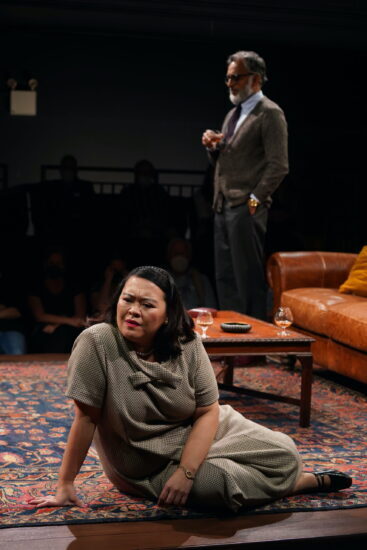
Claire (Carmen M. Herlihy) and Tobias (Manu Narayan) wonder where it all went wrong in A Delicate Balance (photo by Carol Rosegg)
When Claire asks them why they left their house in the middle of the night, Harry says, “I . . . I don’t know quite what happened then; we . . . we were . . . it was all very quiet, and we were all alone . . . and then . . . nothing happened but . . . nothing at all happened, but . . .” Edna adds, “We got . . . frightened.” Harry: “We got scared.” Edna: “We were . . . frightened.” Harry: “There was nothing . . . but we were very scared.” Edna: “We . . . were . . . terrified.” Harry: “We were scared. It was like being lost: very young again, with the dark, and lost. There was no . . . thing . . . to be . . . frightened of, but . . .” It’s a chilling scene, something that everyone can relate to, a sudden, unexpected fear of the unknown, in this case despite apparent wealth and success. But it’s even more powerful in 2022, delivered by these actors, when anti-Asian hate is rising in the United States and around the world.
Empty nesters Tobias and Agnes take them in and put them up in Julia’s room, news that the daughter greets with loud anger and resentment. Agnes next considers how her life would have better if she were born a man, in which case her only worries would be money and death.
Many cognacs and martinis are sipped as the six characters — haunted by the memory of Tobias and Agnes’s deceased child — mock one another, promise not to reveal secrets, ponder nuclear annihilation, and try to get Claire to stop playing her accordion. “I tell ya, there are so many martyrdoms here,” Claire declares at one of numerous uncomfortable moments. “One to a person,” Edna says.
Through it all, the regal Agnes, who believes strongly in manners and how one presents oneself to others, tries to keep everything from falling apart. She tells Tobias and Julia without much fanfare, “There is a balance to be maintained, after all, though the rest of you teeter, unconcerned, or uncaring, assuming you’re on the level ground . . . by divine right, I gather, though that is hardly so. And if I must be the fulcrum . . . I think I shall have a divorce.” Tobias is stunned, so Agnes clarifies, “No, no; Julia has them for all of us. . . . We become allegorical, my darling Tobias, as we grow older.”
Transport cofounder Cummings III (Come Back, Little Sheba; Broadbend, Arkansas) guides the actors with a steady, assured hand, letting just the right tinge of mystery hover over the proceedings. The all-Asian cast — a first for an Albee play in New York — sparkles in Mariko Ohigashi’s old-school suburban-chic costumes. NYC treasure Katigbak is cool and calm as Agnes, while Narayan portrays Tobias as a stiff-backed man whose nerves threaten to explode at any moment. Herlihy and Chilip are vibrant and noisy as the rowdier relatives, while Juhn and Wolf are like shadowy specters as Harry and Edna, whose fears make our own palpable.
Albee, who would go on to win Pulitzers for Seascape in 1975 and Three Tall Women in 1994, based the sharply drawn characters on relatives of his; I can’t imagine what a dinner party would be like with them. Well, maybe I can. And I’ll be sure to invite my friend who shouldn’t have skipped this revival.
[On November 9, there will be a preshow Casting Conversation with casting directors Stephanie Yankwitt and Andrea Zee and NAATCO creative producer Peter Kim, moderated by NYU professor Michael Dinwiddie.]
